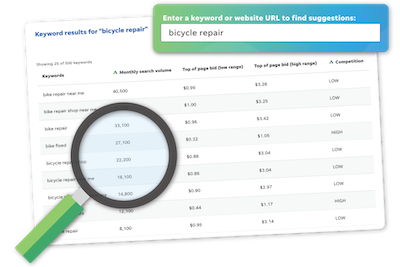Popular Keyword – Plumbing Keywords
Search Popular Keywords in Your Industry
These are the most popular suggestions for Plumbing Keywords generated by WordStream’s Free Keyword Tool. To get have all of these keywords sent to you, simply enter your Email address and click “Email Keywords” below.
Your keywords are on the way to your inbox!
Plumbing Marketing Tips and Tricks
Here at WordStream, we don’t know all that much about plumbing. Contrary to popular belief, we don’t parlay our efforts to improve small business’ online advertising efforts with water heater installation. Never once has a member of our Customer Success team taken an extended lunch break to walk around the neighborhood and offer rapid faucet repairs. That would probably be a well-received public relations campaign, but it’s simply not meant to be.
We make up for what we lack in plumbing expertise with in-depth, data-backed knowledge of online advertising. And that’s why we’re here—to give plumbing companies the tools they need to grow by way of more efficient marketing practices. Here we go!
Unlike an ecommerce site or a pay-per-click advertising software company, a plumber is limited to serving the customers who live within a reasonable distance. As such, it doesn’t make a lot of sense to show your paid search ads to prospects who live outside that area. Allowing your ads to show to consumers outside of your geographical area is harmful in two big ways.
One, it leads to a lot of impressions that don’t turn into clicks—homeowners in Waco, TX have no interest in a plumber in Burlington, VT. This reduces your click-through rates (CTRs), which in turn increases your costs per click (CPC) and worsens your positioning in the search ad ranks.
Two, it leads to clicks from consumers who won’t convert—again, because they’re too far from your business. This means you’re giving Google money and getting no business in return.
To avoid these two contemporaneous nightmares, use the geo-targeting features in Google Ads to make sure you’re only advertising to prospects in your area. You’ll minimize waste spent on irrelevant clicks and keep your ads high in the ranks.
Speaking of irrelevant clicks, it’s crucial to understand search intent. Conveniently, almost all search engine queries can be neatly categorized across three groups: informational, navigational, and transactional. It’s important to attach your search ads to keywords that signify transactional queries because these queries come from prospects with commercial intent—a readiness to purchase. Showing ads to consumers who are simply looking for information or trying to navigate to a particular site will lead to those two wasteful consequences we discussed above.
For plumbers, this means being cautious about keywords such as “leak,” “drain,” and “faucet.” These are known as broad keywords, and although they’re great for exposing your ad to a large audience, the competition is immense and the CPCs are sky-high. Plus, the audiences aren’t terribly relevant—someone searching “drain” could be looking for tips on tuna preparation. To ensure that your ads are linked to only the most relevant search queries, look into long-tail keywords. These are longer, more specific terms that typically capture higher commercial intent. For example, rather than bidding on “drain,” shift your ad spend to terms like “fast drain repair” and “shower drain clogged up.”
Ideally, you want to be the plumbing company that comes to a homeowner’s mind as soon as she encounters a problem. This is an advantage that comes from capturing mindshare, otherwise known as building brand visibility. A fun, creative way to go about this is making short how-to videos to help homeowners with small plumbing issues that they can fix themselves. If you can manage to make these videos humorous as well as informational, you’ll be able to gain traction on platforms like Facebook and Twitter. A single share could potentially expose your business to several prospects in your area whom you haven’t yet reached.
Check out the WordStream blog for more online advertising advice.
BUSINESS KEYWORDS
- Accounting Keywords
- Affiliate Keywords
- Auto Insurance Keywords
- B2B Ecommerce Keywords
- B2B Keywords
- Biotechnology Keywords
- Business Keywords
- Business Management Keywords
- Business Travel Keywords
- Construction Keywords
- Credit Card Keywords
- Debt Keywords
- Entertainment Keywords
- Finance Keywords
- Human Resources Keywords
- Insurance Business Keywords
- Internet Security Keywords
- Management Keywords
- Office Supplies Keywords
- Online Payment Solutions Keywords
- Software Keywords
- Startup Keywords
- Web Hosting Keywords
CONSUMER KEYWORDS
- Art Keywords
- Automotive Keywords
- Casino Keywords
- Cell Phone Keywords
- Computer Keywords
- Dating Keywords
- Ecommerce Keywords
- Electronics Keywords
- Email Keywords
- Fashion Keywords
- Golf Keywords
- Hotel Keywords
- Internet Keywords
- Jobs Keywords
- Law Keywords
- Mortgage Keywords
- Music Keywords
- Online Stores Keywords
- Pest Control Keywords
- Photography Keywords
- Plumbing Keywords
- Real Estate Keywords
- Restaurants Keywords
- Shoes Keywords
- Travel Keywords
- Wedding Keywords
FINANCE KEYWORDS
HEALTH & WELLNESS KEYWORDS
MISCELLANEOUS KEYWORDS
- Aerospace Keywords
- Agriculture Keywords
- Best Travel Keywords
- Coffee Keywords
- Dog Training Keywords
- Education Keywords
- Environmental Keywords
- Food & Beverage Keywords
- Forex Keywords
- Gifts Keywords
- Home Based Business Keywords
- Home Improvements Keywords
- Internet Games Keywords
- iPhone Keywords
- Jewelry Keywords
- Landscaping Keywords
- Legal Keywords
- Luggage Keywords
- Pharmaceutical Keywords
- Poker Keywords
- Retail Keywords
- School Education Keywords
- Solar Energy Keywords
- Transporation Keywords
- Women Fashion Keywords
- Work From Home Keywords

